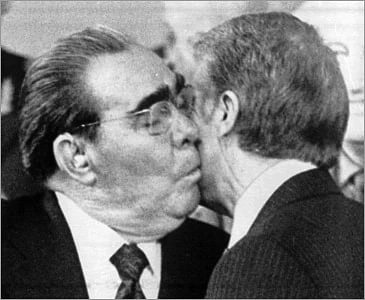Welcome to the My Nuclear Life podcast! In this episode, host Shelly Lesher speaks with Jonathan Alter, author, political analyst, and documentary filmmaker. He has written two New York Times bestsellers, two about Barack Obama and one about FDR. In 2020, he released the book His Very Best: Jimmy Carter, a Life. Carter was also in the Nuclear Navy when it was in its infancy, an experience which shaped many of the policies he pursued while in the White House.
Jonathan was an intern in the speech writing office when Jimmy Carter was in the White House in the summer of 1978. Jonathan’s editor later in life also happened to be Jimmy Carter’s editor. When discussing what book he should write next, she pointed out the fact that nobody had actually written a biography of the former president. Jonathan was impressed by a description Carter gave at a book club of his role at Camp David. He began his book on Carter in 2015. In his research, Jonathan found that Carter was undoubtedly a nuclear engineer and approached problem-solving the way an engineer or scientist would. Jimmy Carter attended Georgia Southwestern College and Georgia Tech before entering the Naval Academy. After he was in the Navy for 5 years, he applied for the most elite program led by Hyman Rickover. Rockover had the idea to put a nuclear power plant on a submarine and succeeded in doing so. This program was the most exciting technological project at the time and played a key role in winning the Cold War. Carter joined for less than a year and worked on the 2nd prototype.
The Chalk River Experimental Reactor, about 100 miles from Ottawa, was the site of the first accident of the Nuclear Age. At that time, people didn’t have any experience with this kind of thing and safety protocols had not been adopted. Though nobody was killed in the accident, it was a huge cause for concern. Rickover assigned Carter to take a team on a highly classified mission to the location to help. On a tennis court, they mocked up an approximation of the reactor and inserted an early video camera into it. When studying the radiation exposure, they found most people were fine and the reactor was eventually reopened. This proved to Carter the importance of not giving in to nuclear fear-mongering. He drew a distinction between uranium reactors and plutonium reactors. Acting on this, Jonathan believes, was the best of Jimmy Carter. Among his other accomplishments, Carter established FEMA (Federal Emergency Management Administration). In the days after the 3 Mile Island accident, he made sure that the federal government and local authorities were properly prepared for evacuations and disaster planning. The real tragedy of Jimmy Carter not getting a second term is in the area of climate change. The recommendations given to him just before the end of his presidency, in 1980, were precisely what the Paris Accord of 2015 agreed to. The takeaway of all of this, Jonathan believes, is to have a nuanced view of nuclear power and to approach problem-solving with facts and reason like Carter did.
Links:
Learn more about Jonathan Alter and purchased his book here.
My Nuclear Life now has a Patreon page, where you can subscribe for bonus content!
Production costs for this episode were provided through National Science Foundation Grant PHY-2011267.





